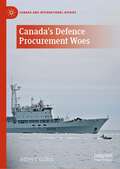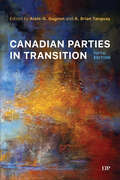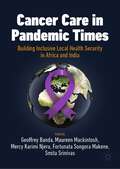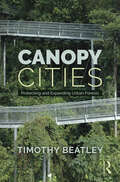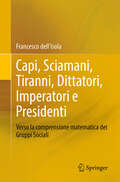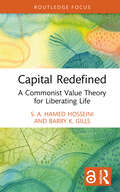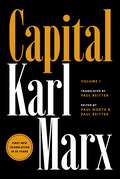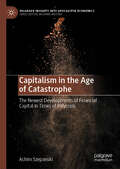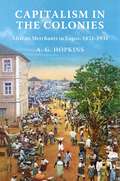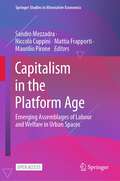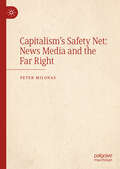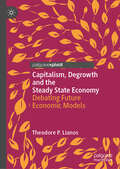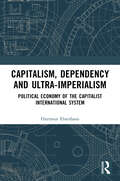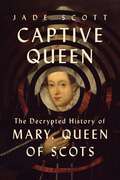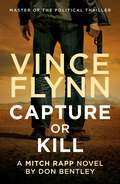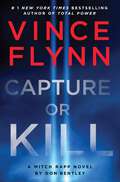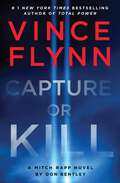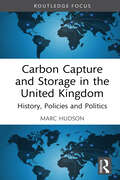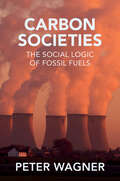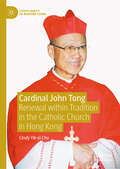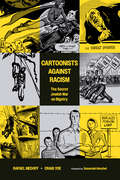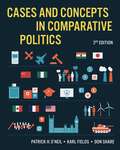- Table View
- List View
Canada's Defence Procurement Woes (Canada and International Affairs)
by Jeffrey F. CollinsThis book challenges the perceived underlying causes and culprits of the ongoing challenges in Canadian defence procurement, arguing that although headlines often put the blame on the political leadership, the defence procurement bureaucracy, ongoing pressures in the defence industry and continuous demands placed on Canada though its alliances also carry a large part of the responsibility. Focusing on four main case studies: the Fixed Wing Search and Rescue Plane, the Joint Support Ships, the Medium Support Vehicle System and the Halifax Class Modernization, the author offers a comparative analysis of how these ongoing procurement efforts were dealt with by different administrations, from Jean Chrétien and Paul Martin to Stephen Harper.
Canadian Parties in Transition, Fifth Edition
by Alain-G. Gagnon A. Brian TanguayThe fifth edition of Canadian Parties in Transition continues and enriches the work of earlier editions in bringing together a highly respected group of scholars to offer a comprehensive account of the development of party politics in Canada. The book addresses the origin and the evolution of the Canadian party system and discusses how that system has been impacted by regionalism, brokerage politics, and political marketing. It focuses on the competing ideological currents that occupy the political stage while also paying attention to the role of third parties in federal politics. Contributors address the representation and democracy through an exploration of voting systems, direct democracy, the role occupied by constituencies, gender politics, and the distinct Quebec dynamics in the federal party system. Finally, the book analyses topical issues, such as electoral participation, social movements, right-wing populist parties, political campaigning, and digital party politics. This new edition has been thoroughly revised and updated to reflect ongoing transformations and includes nineteen new contributing authors and coverage of seven new topics. Canadian Parties in Transition presents a multi-faceted image of party dynamics, electoral behaviour, political marketing, and representative democracy.
Canadian Urban Governance in Comparative Perspective
by Jen Nelles Kristin R. GoodWhat does a comparative approach add to our understanding of Canadian municipal government, city governance, and municipal policy-making? Canadian Urban Governance in Comparative Perspective, brings together experts in the field to situate Canada within global debates about the place of municipalities in democratic constitutions and systems of (multilevel) governance. The contributors offer a comprehensive coverage of Canadian municipal government and governance. The book explores the conceptual and institutional foundations of Canadian municipal systems by placing them in a comparative perspective, highlights seminal works by Canadian scholars to show how comparison adds to our understanding of municipal institutions and city governance, and conceptualizes the place of municipal governments in Canada’s multilevel system. It analyzes comparisons of major elements of municipal systems and examines some of the most important urban and global policy challenges of our time, including the politics of growth and development, climate change, immigrant settlement, addressing racism, municipal-Indigenous relations, and tackling poverty and social polarization. Ultimately, the book invites readers to reflect upon and assess the extent to which Canada’s current municipal systems are up to the task of contributing to effective and equitable responses to contemporary urban challenges and to enriching democratic life in Canada.
Cancel Culture Dictionary: An A to Z Guide to Winning the War on Fun
by Jimmy FaillaYou may know Jimmy Failla as the best dressed man in cable news. A force multiplier of positive energy on the radio who sounds like he gets paid in Tequila and Tide Pods. But he’s also a former New York City Taxi Driver who’s spent countless hours conversing with people from all over this planet and several planets you’ve never heard of. It’s those chats with hobbits, hookers, and time travelers that fill The Cancel Culture Dictionary with the unique perspective and savage self-awareness we need to escape the outrage era society is stuck in. Let’s face it. Life in this country was WAY better before the Smart Phone came along and made us infinitely dumber. Social Media has turned our “shining city on a hill” into a Real Housewives episode on Bravo where every day is a constant cat fight about politics. Weaponized censorship and runaway speech policing has left many people unable to tell the difference between a comedian and a criminal. Although to be fair, sometimes they’re the same, in Bill Cosby’s case. But if there’s one thing we can all be sure of, it’s that spending the past 10 years with our faces glued to our phones has made us crankier, crazier, and much fatter, despite what the Instagram Filters show you.This book is a collection of naughty jokes and nutty people whose stories guide us to a world where we don’t spend all day slugging it out on Twitter, X, or whatever dumb name Elon Musk gives it next time he gets stoned. No, it's not an actual dictionary, although the author should probably spend more time reading one. Think of it as a ridiculous roadmap to a time where life didn’t revolve around the Republican Party and the Democratic Party because we were all too focused on The Keg Party. And unlike other works devoted to the cancel craze, we'll show how the people who lost the most with each celebrity firing were everyday Americans who had nothing to do with it.Cancel Culture and the outrage era have dragged us all into a war on fun. But this book is not a call to arms, girlfriend. If anything, it’s a call to chill the f**k out. So hop in, shut the door, and don’t waste time fiddling with the seatbelt. The way we’re about to drive, it can’t help you anyway.
Cancer Care in Pandemic Times: Building Inclusive Local Health Security in Africa and India (International Political Economy Series)
by Smita Srinivas Maureen Mackintosh Geoffrey Banda Mercy Karimi Njeru Fortunata Songora MakeneThis open access edited volume focuses on the scope and benefits of strengthening local industrial-health linkages. The Covid-19 pandemic collapsed international supply chains for health. That experience brought home to African policy makers the critical nature of local manufacturing capabilities for sustaining and strengthening health care, and highlighted the pandemic benefits of India’s much stronger industrial base. At that time, a network of researchers in East Africa, India and the UK were investigating how to address the crisis of cancer care in low-resource health systems. Their project, uniquely, focused on the scope and benefits of strengthening local industrial-health linkages. The project researchers were also drawn into the pressing demands of Covid19 response. The result is this very timely book. The authors link their research on cancer to pandemic experience, and they draw sharp lessons for how countries can enhance their populations’ health security. The authors argue that improving cancer care is crucial for human wellbeing and more inclusive health care. They challenge policy makers to bring together health needs, health innovations and improved industrial capabilities to embed better cancer care and broader health system improvement in local industrial innovation and development.
Canopy Cities: Protecting and Expanding Urban Forests
by Timothy BeatleyThis book provides a comprehensive overview of the essential role of trees and forests in cities and examines the creative approaches cities around the world are taking to protect trees and expand their urban forests. Moving beyond the view that trees are luxuries and therefore non-essential to the life of a city, the book examines urban tree policies and approaches that foster tree protection, including tree codes and bylaws, and calls for greater community engagement to preserve this important facet of urban life. Through an international range of examples and case studies, featuring cities in the United States, Canada, Singapore, the Netherlands, Australia, France, New Zealand, Mexico, Sierra Leone, and the United Kingdom. The book offers best practice examples where trees have been further integrated into the fabric of urban planning and design, including forested towers, interior rainforests, tiny urban forests, and metropolitan forests. Written by a leading authority in the field, this is a fascinating read for researchers, students, and practitioners in urban planning, landscape architecture, and environmental policy and planning.
Capi, Sciamani, Tiranni, Dittatori, Imperatori e Presidenti: Verso la comprensione matematica dei Gruppi Sociali
by Francesco dell'IsolaQuesto libro mette in luce alcune idee matematiche che aiutano a spiegare una serie di aspetti importanti della dinamica dei gruppi sociali. Le idee e le tecniche utilizzate sono analoghe a quelle che hanno avuto tanto successo nella descrizione del comportamento dei sistemi meccanici lagrangiani: questo libro si rivolge a chiunque voglia comprendere l'unità intrinseca dei fenomeni naturali.
Capital Redefined: A Commonist Value Theory for Liberating Life (Rethinking Globalizations)
by Barry K. Gills S. A. HosseiniCapital Redefined presents a unique perspective on the nature of “capital,” departing from the prevailing reductionist accounts. Hosseini and Gills offer an expanded perspective on Marxian value theory by addressing its main limitations and building their own integrative value theory. They argue that the current understanding of “value” must be re-examined and liberated from its subservient ties to capital while acknowledging the ways in which capital appropriates value. This is achieved by differentiating between “fetish value” created by capital and “true value” generated through various commons-based forms of coexistence. The authors propose a defetishization of value by rejecting the commonly accepted idea of its objectivity. They introduce their “commonist value theory,” which redefines capital as both the product and process of perverting the fundamental commoning causes of true value into sources of fetish value. Capital is theorized through a “modular” framework, where multiple intersecting processes constitute a comprehensive power structure, a “value regime,” representing an unprecedented degree of the domination of capital over life. Their theory reconciles two apparently incompatible views on the notion of value. One view encompasses all inputs involved in capitalist value production and conflates intrinsic and commodity values. The other warns against this conflation as it treats capital as an entity tightly associated only with commodity production and wage labor. The authors believe that establishing alternative forms of value creation based on normative principles of living in commons is crucial as an analytical base for criticizing existing power structures and economic systems. The book offers a theoretical foundation for transforming our life worlds toward “post-capitalist” futures. It appeals to scholars and students in various fields, such as political economy, capitalism, and post-capitalist studies, economic and political sociology, globalization, development studies, social ecology, and ecological philosophy.
Capital: Critique of Political Economy, Volume 1
by Karl MarxMarx for the twenty-first centuryThe first new English translation in fifty years—and the only one based on the last German edition revised by Marx himselfFeaturing extensive original commentary, including a foreword by acclaimed political theorist Wendy Brown&“An astounding achievement.&”—China Miéville, author of October: The Story of the Russian RevolutionKarl Marx (1818–1883) was living in exile in England when he embarked on an ambitious, multivolume critique of the capitalist system of production. Though only the first volume saw publication in Marx&’s lifetime, it would become one of the most consequential books in history. This magnificent new edition of Capital is a translation of Marx for the twenty-first century. It is the first translation into English to be based on the last German edition revised by Marx himself, the only version that can be called authoritative, and it features extensive commentary and annotations by Paul North and Paul Reitter that draw on the latest scholarship and provide invaluable perspective on the book and its complicated legacy. At once precise and boldly readable, this translation captures the momentous scale and sweep of Marx&’s thought while recovering the elegance and humor of the original source.For Marx, our global economic system is relentlessly driven by &“value&”—to produce it, capture it, trade it, and, most of all, to increase it. Lifespans are shortened under the demand for ever-greater value. Days are lengthened, work is intensified, and the division of labor deepens until it leaves two classes, owners and workers, in constant struggle for life and livelihood. In Capital, Marx reveals how value came to tyrannize our world, and how the history of capital is a chronicle of bloodshed, colonization, and enslavement.With a foreword by Wendy Brown and an afterword by William Clare Roberts, this is a critical edition of Capital for our time, one that faithfully preserves the vitality and directness of Marx&’s German prose and renders his ideas newly relevant to modern readers.
Capitalism in the Age of Catastrophe: The Newest Developments of Financial Capital in Times of Polycrisis (Palgrave Insights into Apocalypse Economics)
by Achim SzepanskiThis book analyses contemporary and future conditions of global finance and capitalism in an age of catastrophe. It illuminates the links between various crises that have beset the world economy in recent decades and sets these in philosophical context, drawing on the work of Marx, Bataille and Baudrillard to forge new understandings of the impact of capitalist hegemony on society and nature. The book introduces the concept of the ‘over’ as a lens through which to reflect on capitalist excess and its negative consequences, such as over-accumulation of goods, over-pollution of the environment, and over-speculation of capital. In particular, it shines a light on the trends of financialization and stagflation, with chapters examining increasingly embedded features of the world economy such as hyper-inflation, the dominance of advanced economy central banks, the phenomenon of repurchase agreements, new asset managers for the ultra-wealthy and index funds to show how capitalist structures continue to drive inequality, ecological breakdown, and geopolitical precarity on a global scale. With a rigorous philosophical and theoretical framework, this book will appeal to political economists, Marxist economists and scholars interested in theories of capitalism.
Capitalism in the Colonies: African Merchants in Lagos, 1851–1931
by A. G. HopkinsAn account that challenges the conventional views of African merchants under colonialism, examining the emergence and changing fortunes of indigenous entrepreneurs in Lagos, NigeriaIn Capitalism in the Colonies, A. G. Hopkins provides the first substantial assessment of the fortunes of African entrepreneurs under colonial rule. Examining the lives and careers of 100 merchants in Lagos, Nigeria, between 1850 and 1931, Hopkins challenges conventional views of the contribution made by indigenous entrepreneurs to the long-run economic development of Nigeria. He argues that African merchants in Lagos not only survived, but were also responsible for key innovations in trade, construction, farming, and finance that are essential for understanding the development of Nigeria&’s economy.The book is based on a large, representative sample and covers a time span that traces mercantile fortunes over two and three generations. Drawing on a wide range of sources, Hopkins shows that indigenous entrepreneurs were far more adventurous than expatriate firms. African merchants in Lagos pioneered motor vehicles, sewing machines, publishing, tanneries, and new types of internal trade. They founded the construction industry that built Lagos into a major port city, moved inland to start the cocoa-farming industry, and developed the finance sector that is still vital to Nigeria&’s economy. They also took the lead in changing single-owned businesses into limited liability companies, creating freehold property rights and promoting wage labour. In short, Hopkins argues, they were the capitalists who introduced the institutions of capitalism into Nigeria. The story of African merchants in Nigeria reminds us, he writes, that economic structures have no life of their own until they are animated by the actions of creative individuals.
Capitalism in the Platform Age: Emerging Assemblages of Labour and Welfare in Urban Spaces (Springer Studies in Alternative Economics)
by Sandro Mezzadra Niccolò Cuppini Mattia Frapporti Maurilio PironeThis open access book provides an overview of urban digital platforms such as Airbnb and Deliveroo, which, along with Amazon, Google, Facebook, and other IT companies, constitute by now the infrastructures for other businesses to operate on and for our social life to go on. These platforms serve as standards-based techno-economic systems that simultaneously capture cooperation through remote coordination and organize labor via algorithm management.Based on a three-years research project, this contributed book outlines a general theory of platform capitalism that conceives these platforms not only as technical devices, but as generative engines that operate at the interface of several aspects, such as digitalization of forms of social cooperation; algorithm-based management of labor and participation; and private and vertical appropriation of profits. These elements are somehow iconic of the capitalist evolution of the last decades, and they open up a reflection on new forms of “primitive accumulation” (in particular regarding data), on the mechanisms used to capture and extract social surplus value, and on the logistic-financial dimensions of capital. Finally, in light of the transformations associated with the COVID-19 pandemic, the authors examine how platforms can evolve into hegemonic organizational structures.Assuming we are all already living in the age of the platform, this book takes a multifaceted approach—combining sociology with urban studies, and political sciences with economics—to grasp the challenges our societies face in terms of ensuring fair economic growth, adequate social protections, and labor rights. It will appeal to anyone interested in digital platforms and how they are changing the organization of labor, urban spaces, and forms of governance.
Capitalism's Safety Net: News Media and the Far Right
by Peter MilonasThe influence of news coverage on the rise of far-right ideologies is undeniable. To better understand the potential impact of the liberal media on the development of authoritarian, ultra-nationalist, xenophobic, racist, or reactionary views, it is essential to explore the connection between dominant ideology and the role of news organizations in society. Using my analytical framework, I demonstrate how the mass media leverages the “safety net” to bolster far-right candidates and parties and weaken radical left-wing political groups and social movements, particularly during capitalist crises. My project goes beyond scrutinizing commercial media and critically analyzes the capitalist mode of production.
Capitalism, Degrowth and the Steady State Economy: Debating Future Economic Models (Palgrave Insights into Apocalypse Economics)
by Theodore P. LianosThis book examines the contemporary state of the capitalist economyand its future trajectory in a world characterized by multiple crises from population growth to ecological damage. Setting an understanding of modern capitalism in global historical context, chapters consider the uncertainty of capitalism’s future and argues that capitalism must adapt dramatically to survive.. The book examines the major problems that a capitalist system faces, including inequality, organized crime, uncontrolled technological development, polarizing geopolitics, food security and climate change. To address these multifaceted challenges andminimize the impact of capitalism in exacerbating them, the book discusses the potential viability of a ‘steady state’ economic model and a de-growth approach to the global economy. It also considers various alternative models for the future, including eco-socialism and participatory socialism. This book deftly weaves together perspectives on a wide variety of issues and will be a useful resource for scholars interested in Marxist economics and heterodox economics, political economy, economic development and economic thought.
Capitalism, Dependency and Ultra-Imperialism: Political Economy of the Capitalist International System
by Hartmut ElsenhansThis book assembles main contributions to an alternative explanation of globalisation and the political economic structures of the international system. As the result of capitalism, globalisation does not transfer basic capitalist structures from the Centre to the Periphery. Capitalism is based on rising mass incomes that create investment opportunities and, thus, the possibility of profit. A structurally homogeneous and ultraimperialist Centre dominates a deeply fissured Periphery of structurally heterogeneous societies and economies. Capitalism penetrates underdeveloped regions and deforms them through rent, which obstructs expanding internal mass markets while labour goes unempowered. Rent constitutes the basis for state operations and the role of emerging state classes. While globalisation disempowers labour in both the West and in the South, it has given new comparative advantage to the South. The shift from rent appropriation in the South via raw material exports to export-led manufacturing is based on devaluation below purchasing power parity and, hence, on a rent from agriculture that is based on the Green Revolution. Its impact is, however, not always sufficient to compensate for the loss of influence experienced by social reformist forces. A novel multipolar system based on the balance power has emerged. Mutliethnic empires are held together with large varieties of however always identitarian ideologies. This global system is composed of powers that are internally and externally opposed to peaceful change. Across the globe, there is an impending danger of globalisation of rent. Print edition not for sale in South Asia (India, Sri Lanka, Nepal, Bangladesh, Pakistan and Bhutan)
Captive Queen: The Decrypted History of Mary, Queen of Scots
by Jade ScottAn expert historian on Mary, Queen of Scots draws on hundreds of her encrypted letters to paint a vivid portrait of one of history&’s most compelling figures.For almost two decades before her execution at Fotheringhay Castle in 1587, Mary, Queen of Scots was a prisoner. From her chambers, she wrote countless letters, many encrypted using complex ciphers to prevent her communications from being intercepted. In this way, she used language to exert her will and her influence, even while incarcerated. More than four hundred years after Mary&’s death, the discovery of further encoded letters has led to renewed interest in the breadth of her correspondence while in captivity. In Captive Queen: The Decrypted History of Mary, Queen of Scots, Jade Scott draws on hundreds of these ground-breaking letters to create a vivid picture of one of history&’s most fascinating personalities. She interprets Mary&’s complex relationships with friends and enemies alike throughout the years of her imprisonment, illuminating Mary's strategic vision while bringing her captivity to life like never before.
Capture or Kill
by Vince Flynn Don BentleyMitch Rapp faces an old foe from Iran in the new thriller in Vince Flynn's #1 New York Times bestselling series, now written by bestselling author Don Bentley. In 2011, on a remote Iranian mountain, a group of high-level officials have just witnessed the successful demonstration of a new weapons system meant to upend the American-led war in Afghanistan by essentially decimating the population. The intelligence officer recognises what this development signifies even if his contemporaries do not. A fellow participant seems to agree with the intelligence officer&’s reticence, remarking that he wished there was someone they could tell about this madness. But there is someone the intelligence officer can tell. One man who might just make a difference. In D.C., CIA Director Irene Kennedy presents the President with news that Bin Laden may have been found, but the President wants proof of Bin Laden's presence, and he only trusts one man to provide it. In Pakistan, Mitch Rapp encounters Azad Ashani, director of the Iranian Ministry of Intelligence and Security, the master spy who once functioned as Irene Kennedy&’s back channel to the Iranian government. Ashani owes Rapp, and he intends to settle his debt by providing a piece of intelligence about an American special operations team in Afghanistan, about to interdict a high value target. However, Ashani knows the new Iranian weapons plan is a trap, and to stop it, he's willing to partner with only one man: Rapp.
Capture or Kill (A Mitch Rapp Novel #23)
by Vince Flynn Don BentleyPREORDER DENIED ACCESS, THE NEWEST PULSE-POUNDING THRILLER IN THE NEW YORK TIMES BESTSELLING MITCH RAPP SERIES, COMING THIS SEPTEMBER.As war looms in the Middle East, only Mitch Rapp can deliver truth and justice. 2011. On a remote mountaintop overlooking the remains of the Iranian nuclear weapons programme, Azad Ashani witnesses a Quds Force demonstration of a capability meant to upend America&’s war in the Middle East. Ashani, director of the Iranian Ministry of Intelligence and Security and Irene Kennedy&’s former back channel to the Iranian government, recognises the demonstration&’s true significance and the nation-ending conflict it will provoke. In Washington, DC, CIA director Irene Kennedy briefs the president that the operational window to kill or capture Osama bin Laden is rapidly closing. But before he&’ll authorise a commando raid on Pakistani soil, the president demands irrefutable proof of bin Laden&’s presence. Proof he trusts just one man to provide. Praise for the Mitch Rapp series &‘Grabs you by the scruff of the neck on page one and doesn&’t let you go until the end&’ Stephen Leather &‘Sizzles with inside information and CIA secrets&’ Dan Brown &‘A cracking, uncompromising yarn that literally takes no prisoners&’ The Times &‘Vince Flynn clearly has one eye on Lee Child's action thriller throne with this twist-laden story . . . instantly gripping&’ Shortlist &‘Action-packed, in-your-face, adrenalin-pumped super-hero macho escapist fiction that does exactly what it says on the label&’ Irish Independent &‘Mitch Rapp is a great character who always leaves the bad guys either very sorry for themselves or very dead&’ Guardian
Capture or Kill: A Mitch Rapp Novel by Don Bentley (A Mitch Rapp Novel #23)
by Vince Flynn Don BentleyMitch Rapp faces an Iranian foe bent on destabilizing the Middle East in this &“bloody, electrifying adventure&” (The Real Book Spy) from Vince Flynn&’s #1 New York Times bestselling series, now written by the &“worthy successor to Tom Clancy&” (Publishers Weekly) Don Bentley.April 2011: On a remote mountaintop overlooking the remains of the Iranian nuclear weapons program, Azad Ashani witnesses the successful demonstration of a new weapons system meant to upend the American-led war in Afghanistan. Ashani, director of the Iranian Ministry of Intelligence and Security and Irene Kennedy&’s former back channel to the Iranian government, recognizes the demonstration&’s true significance, and the nation-ending conflict it will provoke. Alone, Ashani stands no chance of preventing this rush to madness. But with the help of one man, he just might. In Washington, DC, CIA director Irene Kennedy briefs the president that the operational window to kill or capture Osama bin Laden at his recently discovered compound in Abbottabad, Pakistan is rapidly closing. But before he&’ll authorize a commando raid on Pakistani soil, the president demands irrefutable proof of bin Laden&’s presence. Proof he trusts just one man to provide. Preventing a looming war in the Middle East while delivering justice for the nearly 3,000 Americans killed on 9/11 would be a big ask for anyone but Mitch Rapp isn&’t just anyone in this high-octane thriller that is perfect for &“action junkies&” (Kirkus Reviews).
Carbon Capture and Storage in the United Kingdom: History, Policies and Politics (Routledge Focus on Energy Studies)
by Marc HudsonThis book is a concise but comprehensive guide to the history, present and possible futures of carbon capture and storage policy and action in the United Kingdom (UK).There have been multiple failed starts, promises and “last chances” for carbon capture and storage (CCS) in Europe, North America, China and Australia, but thus far it has repeatedly collided with the political and economic realities that the technology is too expensive and complicated to gain and keep policymakers’ support. However, in the UK that might be changing, with explicit government support for CCS to help decarbonise industry. Set within the broader context of global interest in CCS, this book first outlines the technologies involved in the types of capture technology, transport options and storage options in the UK. It then briefly introduces an overarching policy analysis framework (John Kingdon’s multiple streams approach) and uses it to give an account of the long history of CCS interest and efforts in three chapters covering the 1970s to 2002, 2003 to 2015 and 2016 to the present day. Marc Hudson focusses on the various arguments made for the introduction of CCS, and the slowly shifting coalitions of actors who make those arguments, while contrasting these with the perspectives of those opposed to CCS.This book will be of great interest to students, scholars and policymakers researching and working in the field, as well as the related areas of energy policy, energy transitions and climate change.
Carbon Societies: The Social Logic of Fossil Fuels
by Peter WagnerThe climate crisis is humanmade. Its main cause is the burning of fossil fuels. To combat climate change, we have to understand how we arrived at where we are. This book explores the reasons why human societies have embarked on the trajectory of ever-increasing use of fossil fuels.Population growth, desire for freedom from want and profit-seeking all played major roles in shaping human history, but there has been no inevitable drive towards heating up the atmosphere in the pursuit of social objectives. To sustain a growing population, more natural resources are required, but their use does not need to generate climate change. No logic of modernity links freedom with a kind of material abundance that requires the burning of fossil fuels. No logic of capital necessarily ties the search for profit to the extraction of fossil resources.Examining the critical junctures in human history when resource regimes changed, this book identifies the social problems that were meant to be solved by burning fossil fuels and the power hierarchies that shaped the decisions to use them. Wagner argues that the key choices that led to the climate emergency were made relatively recently, during the second half of the 20th century: they are close enough in time for us to undo the prevailing social logic of fossil fuels. By redefining the key problems that humankind is facing and reshaping the existing mechanisms of power, we can take the decisive action needed to reduce our dependence on fossil fuels and avert the worst consequences of climate change.
Cardinal John Tong: Renewal within Tradition in the Catholic Church in Hong Kong (Christianity in Modern China)
by Cindy Yik-yi ChuThis is a biography of Cardinal John Tong of Hong Kong, which charts his experiences through the Second World War, his time as a seminarian in Macau, and his studies in Rome during the Second Vatican Council (1962-65), which represented a pivotal moment in modern Catholic Church history. Upon his return to Hong Kong, he became a prominent figure within the Church. His story provides a more critical insight into the development of the Church in Hong Kong and China. Since 1979, Cardinal Tong has made over one hundred visits to the mainland of China, thereby making a significant contribution to the development of the Church. This biography constitutes an invaluable historical record of the Church since 1979. The author has made effective use of the personal writings of Cardinal Tong, which have not been previously utilized and have not been included in any published materials until now. This book illuminates the pivotal role of Hong Kong, which has been largely overlooked in previous accounts. The history of the Chinese Catholic Church will undoubtedly require rewriting following the publication of this biography.
Caring for the Socially Marginalised in Interwar Europe, 1919–1939: The Mixed Economy of Welfare (New Directions in Welfare History)
by Michele Mioni Stefano PetrungaroThis book investigates the mixed economy of welfare that assisted socially marginalised people in interwar Europe, namely the state, local authorities, and a combination of voluntary and informal actors. While literature has traditionally emphasised the key role of the state, the cooperation between public authorities and private actors has always been a staple of social policy in Europe throughout history. The interwar years prominently featured these entanglements between the increased public sphere of action and the voluntary sector. Focusing on three thematic areas: warfare and its effects; boundaries of aid and institutional segregation; and gender and religion, the authors present case studies from various European countries between 1919 and 1939. All contributions explore the variegated world that composed the so-called mixed economy of welfare. By shifting the emphasis to the collaborations and frictions between social marginals, non-state actors, and public authorities on a local, national, and transnational level, the book challenges too simplistic distinctions between public and private initiatives and reveals the cultural, political, and practical common traits that featured in European care for marginals across a variety of geographical variations and socio-political contexts.
Cartoonists Against Racism: The Secret Jewish War on Bigotry
by Craig Yoe Rafael MedoffHorrific scenes of anti-Jewish violence in Europe filled the newsreels in American theaters in the 1930s and 1940s.What could be done to make sure it didn&’t happen in America? One Jewish organization hit upon a remarkable idea—to enlist some of America&’s most beloved cartoonists to wage a war on bigotry.Cartoonists Against Racism uncovers the secret campaign to create anti-racist comics and cartoons to flood America&’s newspapers, classrooms, and union halls. Meet the artists and the work that was their ammunition in the battle for America&’s soul.The book showcases impactful anti-racism artwork from the era&’s preeminent cartoonists, including multiple Pulitzer Prize winners Bill Mauldin and Vaughn Shoemaker; New Yorker cartoonists Carl Rose, Mischa Richter, and Frank Hanley; famed antiwar cartoonist Robert Osborn; Dave Berg of Mad magazine; renowned sports cartoonist Willard Mullin; noted labor cartoonist Bernard Seaman; comics artist Mac Raboy (Flash Gordon, Captain Marvel Jr.); and Eric Godal, who escaped from Nazi Germany and became a leading cartoonist in the American press and acclaimed artist Dick Dorgan.
Cases and Concepts in Comparative Politics (Third Edition)
by Don Share Patrick H. O'Neil Karl J. FieldsConnect comparative politics concepts to the real world Cases and Concepts in Comparative Politics bridges the gap between understanding and doing comparative politics. Concepts are presented in the context of real situations with pedagogy that asks students to apply their new knowledge immediately in country case studies. Students spend more time actually doing the work of comparative politics. This purchase offers access to the digital ebook only.
